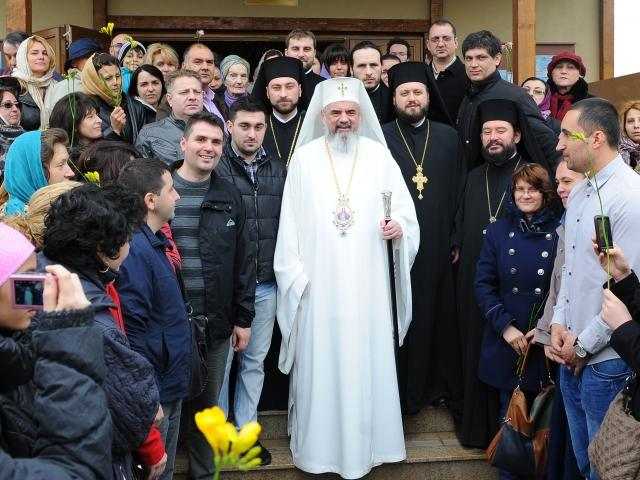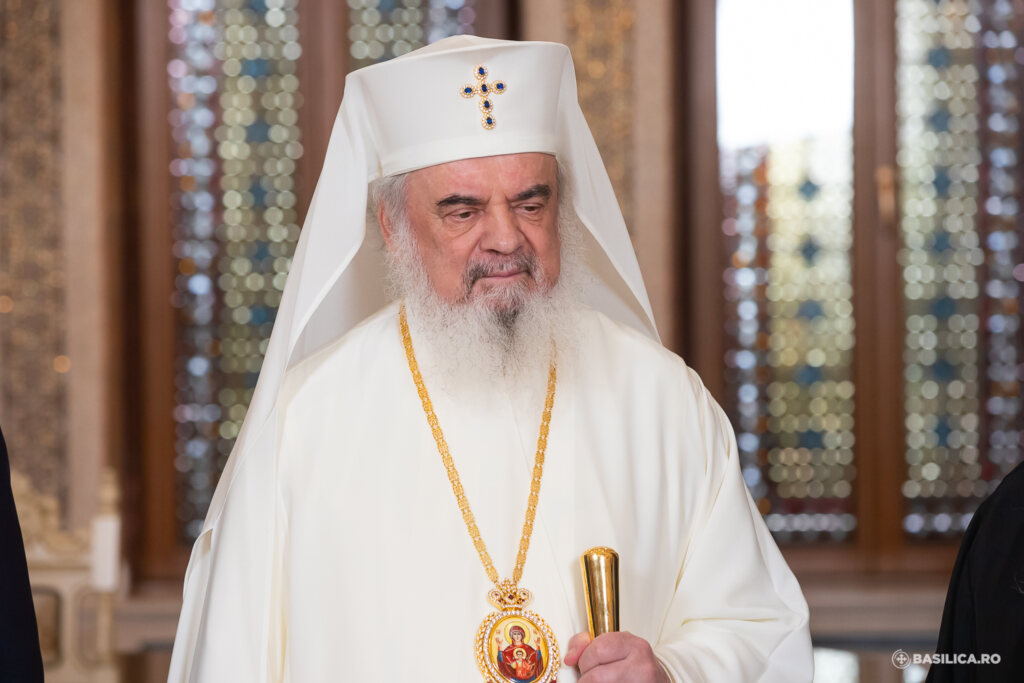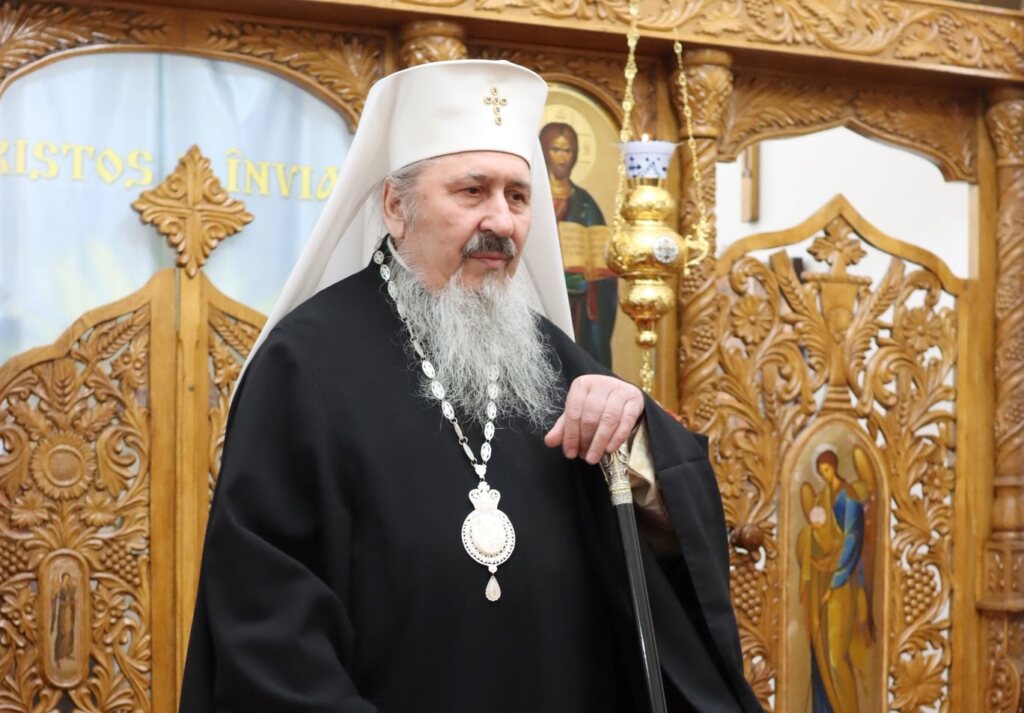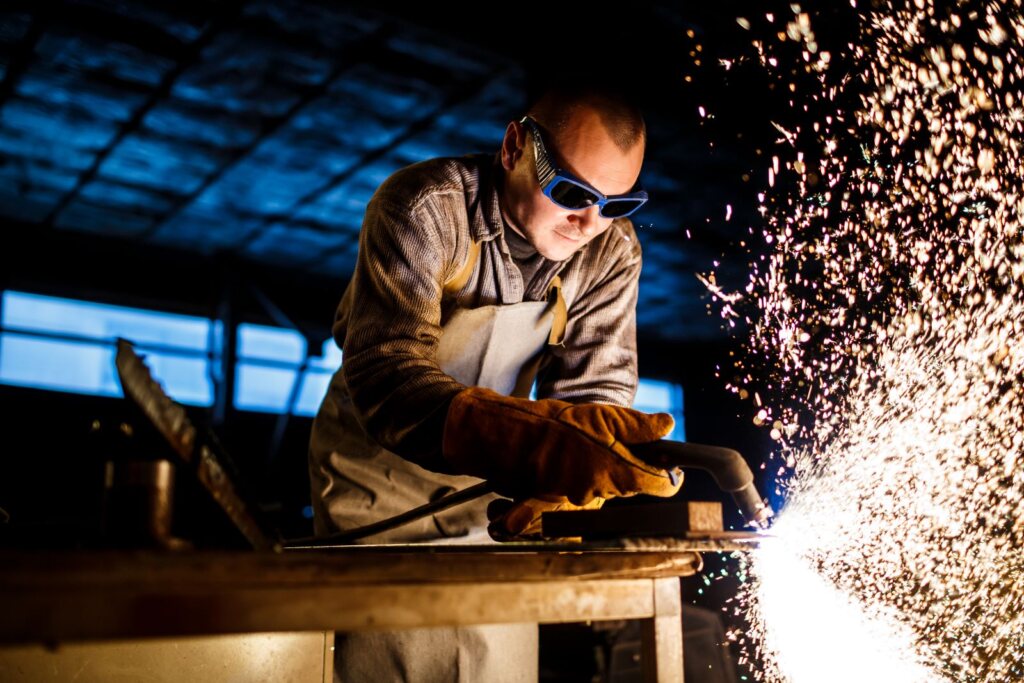Today, 7 April 2013, the Orthodox Christians celebrate the Holy Cross Sunday. On this Sunday, the 3rd of the Lent, His Beatitude Daniel, Patriarch of the Romanian Orthodox Church, celebrated the Divine Liturgy at the chapel of the Cathedral for the Nation’s Salvation, assisted by a group of priests and deacons. The Patriarch of Romania explained in the sermon delivered the Evangelical pericope of Saint Mark the Evangelist that the Church scheduled for today, and emphasised the fact that Jesus Christ, our Saviour shows three conditions for a person to become His disciple and get salvation: self denial, assume the cross, and following Christ.
The power and joy of the Resurrection is hidden in the cross
His Beatitude showed why the Holy Cross Sunday was scheduled in the middle of the Lent pointing out the fact that Orthodoxy has never separated the cross from the Resurrection.
“As the Holy Fathers say, the Church scheduled the 3rd Sunday of the Lent for reminding the fact that the tree of life was planted in the middle of the paradise, but because of disobedience and lack of repentance our ancestors Adam and Eve lost it. Now, Christ, our Lord, the new Adam, gives us the tree of life through the life giving cross, through His sacrifice out of His merciful never ending merciful love for man and of complete obedience to God, so that we get back – says Saint Isaac the Syrian – through the Holy Eucharist, the tree of life that Adam lost because of his disobedience, lack of fasting, and repentance. So, the Cross shows us that in order to reach eternal life and get close to the tree of life, to the Holy Divine Eucharist, we must restrain ourselves, obey God and His Word, fast, and repent our sins. Thus, we feel that the power and joy of the Resurrection are hidden in the cross. Orthodoxy has never separated the cross from Resurrection because the same devoted, sacrificial love seen in the mystery of the cross shows its glory in the light of the Resurrection”, His Beatitude said.
Self denial is liberation from the prison of one’s own selfishness in order to become humans loving God and the fellow beings
The Patriarch of Romania spoke about the true freedom showing that a man is free as long as he can love God and his fellow beings.
“Self denial means giving up a selfish way of life focused on the selfish possessive self, limited and temporary, and passing from this central point of the selfish life to a central relationship of our life with Christ, the source of eternal life, of love and infinite, unlimited freedom. Therefore, self denial means that we no longer focus on our love and concern, but on Christ. (…) Self denial is the liberation from the prison of one’s own selfishness in order to get the true love, merciful devoted love that we show to God in prayer and to our fellow beings in good deeds. Self denial is the liberation from the prison of one’s own selfishness in order to become beings loving God and the fellow beings, because a man is free as long as he can love God and his fellow beings. Man who does no longer pray is not a free man anymore, because he forgets about God, the man who is no longer merciful is not free anymore because he forgot about the need of his fellow being, and turned his own life into the grave of his own soul. So, self denial is a work for librating the human being from selfish passions”, His Beatitude explained.
To end with the Divine Liturgy celebrated at the chapel of the future Patriarchal Cathedral, the Primate of our Church congratulated the servant priests over here for their missionary pastoral activity unfolded at the altar close to the building yard. His Beatitude has also appreciated the efforts of the faithful who support the building of this Cathedral.
“This chapel dedicated to the Resurrection of the Lord keeps the conscience and hope of the faithful awake for building the new cathedral. Although the people are poor, and their income low, the sacrifice of the donations of the faithful surpass some of the eparchies’ in the country due to the fact that the church is near the new cathedral so that those who come to pray here see the building yard nearby.
His Beatitude announced on this occasion that this year, the traditional Palm Sunday pilgrimage on Lasarus’ Saturday will set off from the Cathedral for the Nation’s Salvation.
“We hope we shall be able on Lasarus’ Saturday, when the Palm Sunday pilgrimage is organised in Bucharest to set off not from Radu Voda Monastery, but from the new Cathedral. We shall say a thanksgiving prayer on this concrete floor marking level 0 for this stage reached and then the ceremony with the victory insignia, willow branches and flowers, will set off from the new Cathedral to reach the Patriarchate where we shall meet those attending the religious service”, His Beatitude Daniel, Patriarch of the Romanian Orthodox Church said.
To end with about 200 books of prayer were given to those who donated blood on Friday and Saturday, at the Sanguine Transfusions Centre of Bucharest. In the sermon delivered His Beatitude named the blood donation a sacrificial mercy: “These days another kind of mercy was seen here, namely many faithful who come to this chapel of the Cathedral for the Nation’s Salvation, urged by Rev. Archimandrite Ciprian Grădinaru, donated blood proving mercy to those in distress, in serious states, badly needing the blood donated by others. This is mercy too, a sacrificial mercy because we help others with not such a good health as ours, and in serious situations.”
His Beatitude has also received a basket of flowers on behalf of the servant priests of the chapel of the Cathedral for the Nation’s Salvation.
The Holy Cross Sunday was instituted at Constantinople in the 3rd century. It is difficult to learn more about its origin, besides the fact that it seemed to have been well established in Constantinople from 715 – 730, because Patriarch Gherman consecrated it a homily at the time.






